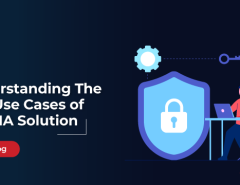In old days, the life in technology was simple with simple security issues. Hackers were amateurs who broke the security of networks just for fun. But today, cyber criminals use sophisticated technology to break into the secure network of an enterprise, steal its precious data and make gains from it. If they do not steal the information, they manipulate it or destroy it, so that the business gets impacted, without the enterprise even realizing that its data has been compromised. This happens despite companies spending thousands of dollars on implementing security systems. Once the criminals break into the system, the data is sitting there waiting for them to play with it as they please. This is where the encryption of data comes to the rescue of the enterprise. It is the last line of defense and a very strong one, against the breach of a company’s cyber security.
What is Data Encryption?
Encryption is a process by which data is transformed into another form or code, in such a way that only people with a decryption key can understand it. The encrypted data is called ciphertext and unencrypted or decrypted data is called plaintext. An encryption algorithm is run on the plaintext along with an encryption key. The output of this algorithm is ciphertext, which looks like garbage string of characters that have no intelligible information. This ciphertext is passed onto the destination location over usual channels and the original encryption key is passed separately. This decryption algorithm is run on ciphertext using the same encryption key to retrieve the original plaintext. It is virtually impossible for anyone, who steals this data, to understand it without decryption. The strength of the encryption depends upon the strength of the algorithm and the length of the encryption key.
Why use data encryption?
1. Business information security – The amount of data stored digitally in enterprises is humongous. All information related to customer, business, finances, products and Intellectual Property is stored digitally. The enterprise communication is done using emails, messengers,and other collaboration tools. Additionally, there are a variety of interfaces and devices accessing the enterprise data. This means that, even for a small company, the number of data endpoints which can be used to break into a network is It is extremely difficult to be sure that your systems are safe from data breach or theft at all times across all endpoints. Encryption ensures that even if the data is stolen, it cannot be deciphered thereby preventing exposure of crucial information to hackers. It’s like stealing a vault but being unable to break it open. Encryption discourages the attacks on enterprises as criminals understand that despite being inside the network, there isn’t much that they would gain.
2. Data integrity– Many times the criminals breach an enterprise’s network with malicious intent of harming the company. They change or manipulate the data to create trouble for the organization. They may alter customer data (e.g. addresses, so that the product deliveries go to the wrong address) or financial data (e.g. change the tax rates to falsify the P&L statement of the enterprise) or do other similar damages. These breaches and changes to data are difficult to identify and cause huge losses to the enterprise. When criminals try to change the encrypted data, it returns garbage even after decryption and thus it is easy to identify and take corrective measures. The encryption of data helps maintain the integrity of the enterprise data.
3. Legal and compliance– Many businesses handle data that include customer’s personally identifiable data, his financial and account information, card details and his nonpublic personal information. Legally, such organizations, are required to protect all customer information that they possess. Almost all governments around the globe have enacted regulations that must be followed by businesses while handling customer data. Any organization found to breach such regulation faces legal action which may result in huge fines and possibly shutting down of the business as well. Encryption helps in compliance with such regulations and builds customer confidence that even if data gets stolen, it stays safe from misuse.
Irrespective of the size of the organization, safeguarding data is no longer optional for anyone. From meeting regulations to maintaining customer relationships, encryption can save a lot of pain for enterprises. A strong security strategy that includes encryption and encryption key management will enable the enterprises to do more with their data, application, and products.
Seqrite helps businesses simplify IT security and maximize business performance. To know more about our products and services visit our website or




